Cosmology
-
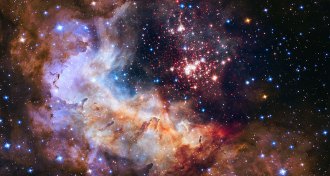 Astronomy
AstronomyAstronomers celebrating Hubble’s past focus on its future
Astronomers celebrate the 25th anniversary of the Hubble Space Telescope by reflecting on its diversity and looking ahead to the future.
-
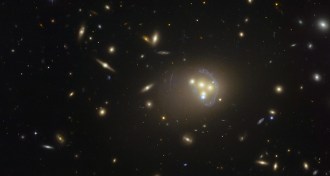 Astronomy
AstronomyGalactic split provides clue to dark matter mystery
An oddly divided galaxy may provide the first evidence that dark matter particles interact through a force other than gravity.
By Andrew Grant -
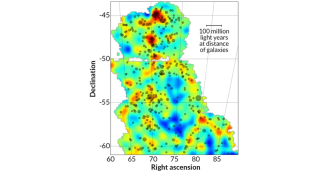 Astronomy
AstronomyMap pinpoints location of invisible dark matter
A new map shows that dark matter is concentrated in regions that contain a lot of ordinary matter in the form of galaxy clusters.
By Andrew Grant -
 Astronomy
AstronomyMap pinpoints location of invisible dark matter
Dark matter can’t be seen, but a new map shows where it’s hiding. The map confirms that the mysterious matter is concentrated in regions that contain a lot of ordinary matter in the form of galaxy clusters.
By Andrew Grant -
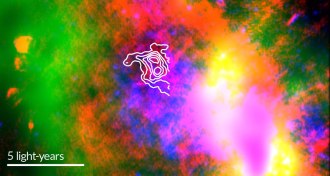 Astronomy
AstronomySpace dust is tough enough to survive supernova aftermath
Dust still lingers in the remnants of supernova that exploded 10,000 years ago, affirming that the explosions filled the early universe with dust.
-
 Cosmology
CosmologyIn era of collaboration, individual initiative can still pay off
A risky venture to study cosmic ray particles offers no guarantee of success, but it may help answer two of the biggest questions in physics.
By Eva Emerson -
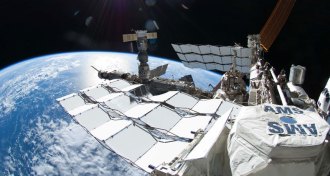 Particle Physics
Particle PhysicsSam Ting tries to expose dark matter’s mysteries
Particle physicist Sam Ting is applying a meticulous approach to analyzing positrons in space, testing whether they can reveal clues about dark matter.
By Andrew Grant -
 Astronomy
AstronomyHubble telescope sees quadruple
A galaxy bends light to create four images of the same supernova.
-
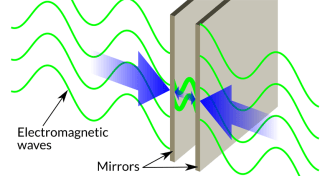 Quantum Physics
Quantum PhysicsTrying to get the down-low on gravity
A twist on a classic quantum mechanics experiment could lead to the discovery of elusive gravitons.
By Andrew Grant -
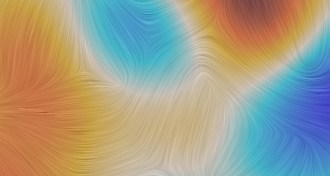 Cosmology
CosmologyThe past according to Planck: Cosmologists got a lot right
New results from the Planck satellite largely support cosmologists’ theories, but leave the door open for new discoveries.
By Andrew Grant -
 Astronomy
AstronomyFinding joy and inspiration in the pursuit of knowledge
Editor in Chief Eva Emerson ruminates on the power of knowledge, and the ways scientists are refining how we think about the aging human brain, far away comets and even the speed of light.
By Eva Emerson -
 Astronomy
AstronomyFirst stars born later than thought
New results from the Planck mission indicate that the first stars began to shine 550 million years after the Big Bang.